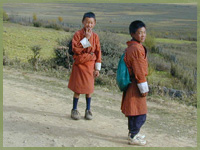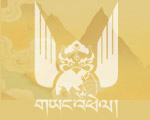 Bhutan's
traditional self-contained cultural system is intrinsically
fragile in the face of ongoing modern developments. Indeed,
the current situation is in no small part the consequence of
delayed entry to the outside world and then only partial and
controlled exposures. As the country becomes regionally and
globally integrated, clear established boundaries are being
both broken down and permeated. Increasing contact to powerful
new ideas and the fundamental changes that these imply, threatens
to undermine the very foundations of the preexisting system.
The cultural dynamic that previously drew predominantly on domestic
influences to generate a gradual and internally consistent succession
has now been opened up to unfamiliar, persuasive, multidimensional,
potentially contradictory and destabilizing external authorities.
Bhutanese culture is experiencing a paradigm shift. Bhutan's
traditional self-contained cultural system is intrinsically
fragile in the face of ongoing modern developments. Indeed,
the current situation is in no small part the consequence of
delayed entry to the outside world and then only partial and
controlled exposures. As the country becomes regionally and
globally integrated, clear established boundaries are being
both broken down and permeated. Increasing contact to powerful
new ideas and the fundamental changes that these imply, threatens
to undermine the very foundations of the preexisting system.
The cultural dynamic that previously drew predominantly on domestic
influences to generate a gradual and internally consistent succession
has now been opened up to unfamiliar, persuasive, multidimensional,
potentially contradictory and destabilizing external authorities.
Bhutanese culture is experiencing a paradigm shift.
The goal of, and associated initiatives towards, development
and modernization implies some fundamental alterations in
traditional legacies. Previously stable social and economic
systems are being transformed, generating major structural
changes and a host of new opportunities. The relatively equal
distribution of such opportunities requires significant alterations
in the traditional distribution of power. Furthermore, an
augmented emphasis on the material dimension naturally distracts
attention from the spiritual, thereby diminishing the popular
role of religion. Notions of both individual and national
accomplishment are shifting - now valuing material progress
and constant development - and are becoming increasingly difficult
to achieve. The ongoing strength and unity of an inherently
dynamic culture will require it to continue to collectively
judge its performance a success.
The government response has been to both promote and strengthen
a national culture, and - whilst reforming economic, social,
political and cultural systems - to attempt, during transition,
to maintain a balance between changes in these respective
areas. Keenly aware that strength comes from unity, and that
the nation's continued sovereignty and independence will be
reliant on the preservation of a distinct national identity,
there have been concerted moves towards forming a clear national
culture within its distant and diverse communities. National
unity coalesces around three key interrelated elements: common
history, common religious belief and common leadership. Building
on dominant Ngalop traditions, several national symbols have
been either encouraged or introduced. These include a national
language (Dzongkha), national dress, national religion and
Driglam Namzha, a code of etiquette. All congregate around
the central idea of the Tsa-Wa-Sum - the King, the Country
and the People - a derivation of the Three Jewels in Buddhist
thought.
The processes of integration and development are inherently
uneven. Aspects of traditional cultures and their more tangible
manifestations are both the first things to be affected and
the last things to be completely transformed by ongoing modernization.
Encounters with global capitalist culture tend to encourage
consumerism well before associated political, social and economic
transformations are effected that might enable the overall
satisfaction of these new desires. Aiming to achieve a transition
that is balanced and relatively stable, the government has
placed an emphasis on cultural preservation (or at least avoiding
immediate cultural corruption). Policies aim to both promote
traditional practices and reduce immediate exposure to potentially
disorienting external influences. Tight guidelines have been
put in place regarding traditional dress and architectural
styles. Programmes have been introduced to promote language
and religion. Furthermore, a heavily controlled tourism policy,
an erstwhile ban on television (which was only made legal
in 1999) and tight regulations regarding external business
ventures, all aim at limiting disproportionate cultural contacts.
Government interventions notwithstanding - which should be
interpreted as pragmatic rather than reactionary - transformations
are relentless, and are being generated from both within the
evolving internal environment and more directly from outside.
Processes of social and economic change are altering the parameters
within which people exist. Whereas the lifestyles of the majority
have been slowly shifting, a select very modern community
has emerged, associated with high status and wealth, educational
achievement, profession, travel and urban living. New hierarchies
are forming based around connections with multiple aspects
of modernity. With increased opportunities and new aspirations
a modern business mentality has taken root that places an
emphasis on the production of material wealth.
People are experiencing an expansion of life-world and a
broadening of worldview. With the processes of globalization
few remain unaware of alternative ways of life, even if it
is through overt symbols. Although television was banned,
videos were available, along with books and magazines. A generation
gap is emerging in Bhutanese culture, particularly within
the urban communities. Although tradition remains - associated
with family and broader social perforations - the more performative
aspect of culture is promoting a host of modern values. Whereas
the older generation considers that things are moving extremely
fast, for the young they cannot happen quickly enough. Inevitable
undercurrents of discontent are emerging, where some feel
that their abilities and aspirations are becoming stifled.
The traditional Bhutanese culture possessed the ability to
reproduce the valuable elements from its past as it continually
reformed itself to accommodate more current realities. To
date something resembling such equilibrium has been sustained.
However, if the Bhutanese culture maintains its overall coherence
and retains its most valuable aspects amidst the ongoing cultural
whirlwind, it will represent a major - possibly critical -
achievement.
|



